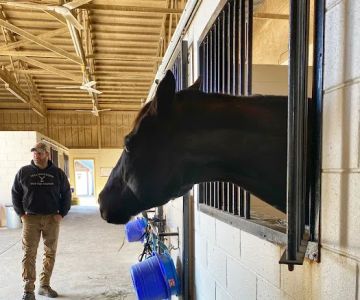The Essential Role of Horse Veterinarians: What Are They Called and What Do They Do?
- What Is a Horse Veterinarian Called?
- The Role of Equine Veterinarians
- Common Treatments Provided by Horse Veterinarians
- Why Horse Owners Need a Veterinarian
- How to Choose the Right Equine Veterinarian
What Is a Horse Veterinarian Called?
If you're wondering what a horse veterinarian is called, the answer is simple: they are known as an "equine veterinarian." This specialized term comes from the word "equine," which refers to anything related to horses. Equine veterinarians, or horse vets, are experts in the care and treatment of horses, from general health maintenance to emergency care. While general veterinarians may treat a variety of animals, equine veterinarians focus solely on horses, making them essential for anyone who owns or works with these magnificent animals.
The Role of Equine Veterinarians
Equine veterinarians play a crucial role in maintaining the health and well-being of horses. From racetracks to farms, they ensure that horses are physically fit and free from diseases. Here’s a deeper look into the main functions of an equine veterinarian:
- Diagnosis and Treatment of Illnesses: One of the primary responsibilities of an equine vet is diagnosing and treating diseases and conditions that can affect horses. These include respiratory infections, gastrointestinal issues, lameness, and more. They use specialized equipment and their in-depth knowledge to make accurate diagnoses.
- Surgical Procedures: Equine veterinarians often perform surgeries to treat injuries or conditions such as fractures, joint issues, and reproductive health concerns. They are trained to carry out procedures under anesthesia to ensure the horse’s safety and comfort.
- Preventive Care: Preventive care is another vital part of an equine vet’s role. This includes regular check-ups, vaccinations, dental care, and parasite control. By preventing health issues before they arise, equine vets help horses live longer and healthier lives.
- Emergency Care: In cases of accidents or sudden illnesses, equine veterinarians are the first responders. They must be able to assess and treat horses quickly, often in high-pressure situations. Whether it's a horse suffering from colic or a severe injury, the equine vet’s expertise can be life-saving.
- Reproductive Health: Equine veterinarians are also involved in managing the reproductive health of horses. They assist with breeding, pregnancy monitoring, and care for foals. Their knowledge is essential for both breeders and owners who wish to ensure the continuation of healthy bloodlines.
Common Treatments Provided by Horse Veterinarians
Equine veterinarians provide a variety of treatments that are essential for maintaining a horse’s health. Here are some of the most common services they provide:
- Vaccinations: Just like humans, horses need vaccinations to protect against various diseases, such as West Nile virus, rabies, and tetanus. Equine vets administer these vaccines to ensure horses are safe from potential outbreaks.
- Dental Care: Horses often suffer from dental problems such as sharp points on their teeth or uneven wear, which can lead to difficulty eating or pain. Equine veterinarians perform dental exams and floating (filing) to maintain healthy teeth.
- Parasite Control: Horses can be prone to internal parasites like worms. Equine vets regularly check for signs of parasitic infections and provide deworming treatments to keep the horse’s digestive system healthy.
- Chronic Condition Management: Many horses suffer from chronic conditions like arthritis, laminitis, or metabolic diseases. Equine vets provide ongoing care and medications to help manage these conditions and improve the horse's quality of life.
- Surgical Interventions: For serious injuries or health issues that cannot be resolved with non-invasive treatments, equine veterinarians may perform surgery. This could range from minor procedures to more complex surgeries such as colic surgery or tendon repair.
Why Horse Owners Need a Veterinarian
As a horse owner, it is crucial to establish a relationship with a trusted equine veterinarian. Regular visits ensure that your horse stays in peak condition, preventing illnesses and injuries before they become serious. I personally learned the importance of having a reliable equine vet when my horse, Storm, developed a lameness issue. After a thorough examination, the vet diagnosed a tendon injury and provided a treatment plan that included rest and specific rehabilitation exercises. Without the timely intervention of an equine vet, Storm’s injury could have been much worse.
Equine veterinarians are not just medical professionals—they are vital partners in the well-being of your horses. They help you understand your horse’s specific needs and provide guidance on diet, exercise, and preventive health measures that will improve your horse’s overall quality of life.
How to Choose the Right Equine Veterinarian
Choosing the right equine veterinarian is essential for your horse’s health. Here are some factors to consider when selecting a veterinarian for your horse:
- Experience and Expertise: It’s important to choose a vet with specialized knowledge in equine care. Look for a veterinarian with experience in the areas that matter most to you, such as surgery, preventive care, or reproductive health.
- Reputation: Ask other horse owners or stables for recommendations. Positive reviews and referrals from those who have firsthand experience with a particular equine veterinarian can help you make a well-informed decision.
- Location and Availability: Ensure that the equine vet is easily accessible, especially in case of emergencies. A vet who is available for late-night calls or weekend visits can be crucial during urgent situations.
- Compatibility: It’s essential to have a good working relationship with your veterinarian. Choose a vet who communicates well, listens to your concerns, and provides clear explanations about your horse’s health.
When you find the right equine veterinarian, you’re ensuring that your horse will receive the best possible care. If you're looking for a trusted equine vet in your area, be sure to check out HeartCare Hub for recommended professionals who can meet all of your horse care needs.











